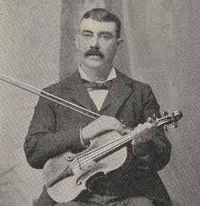Annotation:Paddy in London (1)
X:1 T:Paddy in London [1] M:6/8 L:1/8 R:Jig B:West - Irish Country Dances (c. 1820, No. 79) K:D (G|F)DF AFA|ded def|AGF G2A BGE E2(G| F)DF AFA|ded def|AGF BAG|FDD D2:| |:(f|e)cA Agf|edc d2B|AGF G2A|BGE E2f| agf gfe|ded def|AGF BAG|FDD D2:|]
PADDY IN LONDON [1] ("Paidin ann Lungoun" or "Paidin i Lungdun"). AKA and see "Bear leigean doibh," "B'fhearr leigean dóibh," "Cat in the Corner (4)," "Dublin Jig (1) (The)," “Four Courts (4) (The),” "Paddy's Adventures in London," "Piper Hick's Favorite." Irish, Double Jig. D Major. Standard tuning (fiddle). AABB'CC (O'Neill/1850 & Krassen): AABCC (O'Neill/1915). The melody was first printed by Dublin publisher Smollet Holden in his A Collection of Old Established Irish Slow and Quick Tunes, vol. 2 (c. 1805) as "Bear leigean doibh" or "B'fhearr leigean dóibh" (Better let them be). However, the tune along with the title "Paddy in London" was first printed in W. West's Irish Country Dances (London, c. 1820).

One Monday morning I unexpectedly encountered John McFadden in the corridor outside my office in City Hall, and wondering what' could have happened since we parted the evening before, I asked, ‘What brings you here so early, John?’ ‘I wanted to see you privately in your office, Chief’, he quietly replied. To my suggestion that we could transact our business just as well where we were as in my office, where so many others were waiting, he did not agree, so in we went through three intervening rooms. When the door was closed behind us Mac did not keep me in suspense. ‘Chief, I lost the third part of ‘Paddy in London’ which you gave me last night & when I got up this morning, all I could remember were the first and second parts, and I want you to whistle the missing part for me again.’
Using an early Edison cylinder machine, O’Neill later recorded McFadden playing the tune. Philippe Varlet believes O’Neill acquired it after seeing it at the 1893 Chicago World’s Fair.
The group Buttons and Bows recorded the tune in 1987 as "Four Courts (4) (The)," while fiddler and accordion player Frank Quinn recorded the jig in the 78 RPM era as "Cat in the Corner (4)." See also the related melodies “Paddy from Cork” (Goodman) and “Carrickmacross” (Joyce).

